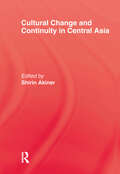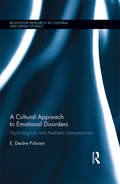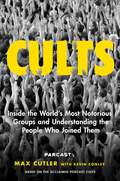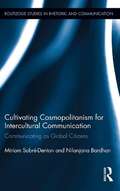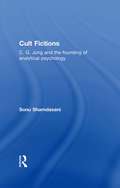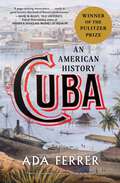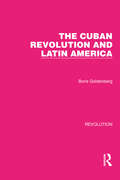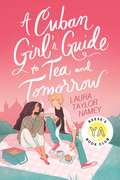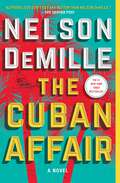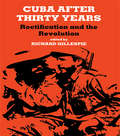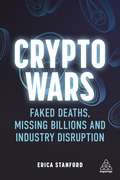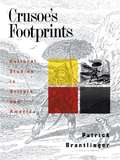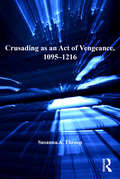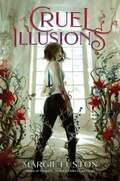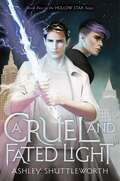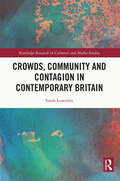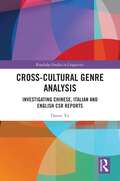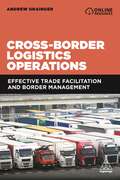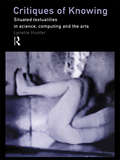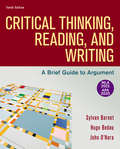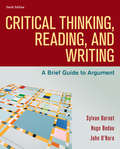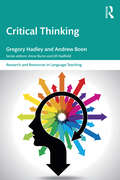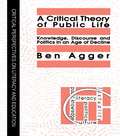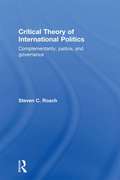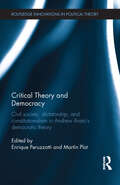Special Collections
Benetech’s Global Certified Accessible Titles
Description: Benetech’s GCA program is the first independent third-party EPUB certification to verify ebook accessibility. By creating content that is born accessible, publishers can meet the needs of all readers. Learn more: https://bornaccessible.benetech.org/
- Table View
- List View
Cultural Change & Continuity In
by AkinerFirst published in 1991. Routledge is an imprint of Taylor & Francis, an informa company.
A Cultural Approach to Emotional Disorders
by E. Deidre PribramIn her latest contribution to the growing field of emotion studies, Deidre Pribram makes a compelling argument for why culturalist approaches to the study of emotional "disorders" continue to be eschewed, even as the sociocultural and historical study of mental illness flourishes. The author ties this phenomenon to a tension between two fundamentally different approaches to emotion: an individualist approach, which regards emotions as the property of the individual, whether biologically or psychologically, and a culturalist approach, which regards emotions as collective, social processes with distinctive histories and meanings that work to produce particularized subjects. While she links a strong preference for the individualist construct in Western culture to the rise of the psychological and psychiatric disciplines at the turn of the twentieth century, Pribram also engages with a diverse set of case studies tied to psychological and aesthetic discourses on emotions. These range from Van Gogh’s status as emotionally disordered to the public, emotional aesthetics of 19th century melodrama to the diagnostic categories of the DSMs and the fear of "globalizing" emotional disorders in the 21st century. This genuinely interdisciplinary approach makes for a text with potential application in a wide range of disciplines within cultural studies, including sociocultural and historical analysis of psychiatry and psychology, gender theory, subject and identity theory, popular culture studies, and history and theory of the arts.
Cults
by Max CutlerMystery. Manipulation. Murder. Cults are associated with all of these. But what really goes on inside them? More specifically, what goes on inside the minds of cult leaders and the people who join them? Based on the hit podcast Cults, this is essential reading for any true crime fan. Cults prey on the very attributes that make us human: our desire to belong; to find a deeper meaning in life; to live everyday with divine purpose. Their existence creates a sense that any one of us, at any time, could step off the cliff&’s edge and fall into that daunting abyss of manipulation and unhinged dedication to a misplaced cause. Perhaps it&’s this mindset that keeps us so utterly obsessed and desperate to learn more, or it&’s that the stories are so bizarre and unsettling that we are simply in awe of the mechanics that make these infamous groups tick. The premier storytelling podcast studio Parcast has been focusing on unearthing these mechanics—the cult leaders and followers, and the world and culture that gave birth to both. Parcast&’s work in analyzing dozens of case studies has revealed patterns: distinct ways that cult leaders from different generations resemble one another. What links the ten notorious figures profiled in Cults are as disturbing as they are stunning—from Manson to Applewhite, Koresh to Raël, the stories woven here are both spellbinding and disturbing. Cults is more than just a compilation of grisly biographies, however. In these pages, Parcast&’s founder Max Cutler and national bestselling author Kevin Conley look closely at the lives of some of the most disreputable cult figures and tell the stories of their rise to power and fall from grace, sanity, and decency. Beyond that, it is a study of humanity, an unflinching look at what happens when the most vulnerable recesses of the mind are manipulated and how the things we hold most sacred can be twisted into the lowest form of malevolence.
Cultivating Cosmopolitanism for Intercultural Communication
by Miriam Sobre-Denton and Nilanjana BardhanWinner of the National Communication Association's International and Intercultural Communication Division's 2014 Outstanding Authored Book of the Year award This book engages the notion of cosmopolitanism as it applies to intercultural communication, which itself is undergoing a turn in its focus from post-positivistic research towards critical/interpretive and postcolonial perspectives, particularly as globalization informs more of the current and future research in the area. It emphasizes the postcolonial perspective in order to raise critical consciousness about the complexities of intercultural communication in a globalizing world, situating cosmopolitanism—the notion of global citizenship—as a multilayered lens for research. Cosmopolitanism as a theoretical repertoire provides nuanced descriptions of what it means to be and communicate as a global citizen, how to critically study interconnectedness within and across cultures, and how to embrace differences without glossing over them. Moving intercultural communication studies towards the global in complex and nuanced ways, this book highlights crucial links between globalization, transnationalism, postcolonialism, cosmopolitanism, social injustice and intercultural communication, and will help in the creation of classroom spaces devoted to exploring these links. It also engages the links between theory and praxis in order to move towards intercultural communication pedagogy and research that simultaneously celebrates and interrogates issues of cultural difference with the aim of creating continuity rather than chasms. In sum, this book orients intercultural communication scholarship firmly towards the critical and postcolonial, while still allowing the incorporation of traditional intercultural communication concepts, thereby preparing students, scholars, educators and interculturalists to communicate ethically in a world that is simultaneously global and local.
Cult Fictions
by Sonu ShamdasaniControversial claims that C.G. Jung, founder of analytical psychology, was a charlatan and a self-appointed demi-god have recently brought his legacy under renewed scrutiny. The basis of the attack on Jung is a previously unknown text, said to be Jung's inaugural address at the founding of his 'cult', otherwise known as the Psychological Club, in Zurich in 1916. It is claimed that this cult is alive and well in Jungian psychology as it is practised today, in a movement which continues to masquerade as a genuine professional discipline, whilst selling false dreams of spiritual redemption. In Cult Fictions, leading Jung scholar Sonu Shamdasani looks into the evidence for such claims and draws on previously unpublished documents to show that they are fallacious. This accurate and revealing account of the history of the Jungian movement, from the founding of the Psychological Club to the reformulation of Jung's approach by his followers, establishes a fresh agenda for the historical evaluation of analytical psychology today.
Cuba (Winner of the Pulitzer Prize)
by Dr. Ada FerrerWINNER OF THE PULITZER PRIZE IN HISTORY WINNER OF THE LOS ANGELES TIMES BOOK PRIZE IN HISTORY &“Full of…lively insights and lucid prose&” (The Wall Street Journal) an epic, sweeping history of Cuba and its complex ties to the United States—from before the arrival of Columbus to the present day—written by one of the world&’s leading historians of Cuba.In 1961, at the height of the Cold War, the United States severed diplomatic relations with Cuba, where a momentous revolution had taken power three years earlier. For more than half a century, the stand-off continued—through the tenure of ten American presidents and the fifty-year rule of Fidel Castro. His death in 2016, and the retirement of his brother and successor Raúl Castro in 2021, have spurred questions about the country&’s future. Meanwhile, politics in Washington—Barack Obama&’s opening to the island, Donald Trump&’s reversal of that policy, and the election of Joe Biden—have made the relationship between the two nations a subject of debate once more. Now, award-winning historian Ada Ferrer delivers an &“important&” (The Guardian) and moving chronicle that demands a new reckoning with both the island&’s past and its relationship with the United States. Spanning more than five centuries, Cuba: An American History provides us with a front-row seat as we witness the evolution of the modern nation, with its dramatic record of conquest and colonization, of slavery and freedom, of independence and revolutions made and unmade. Along the way, Ferrer explores the sometimes surprising, often troubled intimacy between the two countries, documenting not only the influence of the United States on Cuba but also the many ways the island has been a recurring presence in US affairs. This is a story that will give Americans unexpected insights into the history of their own nation and, in so doing, help them imagine a new relationship with Cuba; &“readers will close [this] fascinating book with a sense of hope&” (The Economist). Filled with rousing stories and characters, and drawing on more than thirty years of research in Cuba, Spain, and the United States—as well as the author&’s own extensive travel to the island over the same period—this is a stunning and monumental account like no other.
The Cuban Revolution and Latin America
by Boris GoldenbergThis book, first published in 1965, is a scrupulously fair study of the origins and evolution of Castroism and an assessment of the impact of the Cuban revolution and of Castro’s subsequent domestic and foreign policies on the rest of Latin America. In this analysis it takes into account the great differences – social, economic and cultural – between the countries of the area and looks at the foreign policies of Latin American countries as well as the United States and the role of international Communism.
A Cuban Girl's Guide to Tea and Tomorrow
by Laura Taylor NameyA New York Times bestseller A Reese Witherspoon x Hello Sunshine Book Club YA Pick Love & Gelato meets Don&’t Date Rosa Santos in this charming, heartfelt story following a Miami girl who unexpectedly finds love—and herself—in a small English town.For Lila Reyes, a summer in England was never part of the plan. The plan was 1) take over her abuela&’s role as head baker at their panadería, 2) move in with her best friend after graduation, and 3) live happily ever after with her boyfriend. But then the Trifecta happened, and everything—including Lila herself—fell apart. Worried about Lila&’s mental health, her parents make a new plan for her: spend three months with family friends in Winchester, England, to relax and reset. But with the lack of sun, a grumpy inn cook, and a small town lacking Miami flavor (both in food and otherwise), what would be a dream trip for some feels more like a nightmare to Lila…until she meets Orion Maxwell. A teashop clerk with troubles of his own, Orion is determined to help Lila out of her funk, and appoints himself as her personal tour guide. From Winchester&’s drama-filled music scene to the sweeping English countryside, it isn&’t long before Lila is not only charmed by Orion, but England itself. Soon a new future is beginning to form in Lila&’s mind—one that would mean leaving everything she ever planned behind.
The Cuban Affair
by Nelson DemilleFrom the legendary #1 New York Times bestselling author of Plum Island and Night Fall, Nelson DeMille’s blistering new novel features an exciting new character—U.S. Army combat veteran Daniel “Mac” MacCormick, now a charter boat captain, who is about to set sail on his most dangerous cruise.
Daniel Graham MacCormick—Mac for short—seems to have a pretty good life. At age thirty-five he’s living in Key West, owner of a forty-two-foot charter fishing boat, The Maine. Mac served five years in the Army as an infantry officer with two tours in Afghanistan. He returned with the Silver Star, two Purple Hearts, scars that don’t tan, and a boat with a big bank loan. Truth be told, Mac’s finances are more than a little shaky.
One day, Mac is sitting in the famous Green Parrot Bar in Key West, contemplating his life, and waiting for Carlos, a hotshot Miami lawyer heavily involved with anti-Castro groups. Carlos wants to hire Mac and The Maine for a ten-day fishing tournament to Cuba at the standard rate, but Mac suspects there is more to this and turns it down. The price then goes up to two million dollars, and Mac agrees to hear the deal, and meet Carlos’s clients—a beautiful Cuban-American woman named Sara Ortega, and a mysterious older Cuban exile, Eduardo Valazquez.
What Mac learns is that there is sixty million American dollars hidden in Cuba by Sara’s grandfather when he fled Castro’s revolution. With the “Cuban Thaw” underway between Havana and Washington, Carlos, Eduardo, and Sara know it’s only a matter of time before someone finds the stash—by accident or on purpose. And Mac knows if he accepts this job, he’ll walk away rich…or not at all.
Brilliantly written, with his signature humor, fascinating authenticity from his research trip to Cuba, and heart-pounding pace, Nelson DeMille is a true master of the genre.
A New York Times Bestseller
Cuba After Thirty Years
by Richard GillespieFirst Published in 1990. Routledge is an imprint of Taylor & Francis, an informa company.
Crypto Wars
by Erica StanfordCrypto is big news. You may be an existing user yourself or have friends that laud its promise of getting rich fast. Arm yourself with knowledge to come out on top in the crypto wars. If thousands of people can lose billions of dollars in OneCoin, masterminded by the now infamous Missing Cryptoqueen made famous by the BBC's podcast series and called 'one of the biggest scams in history' by The Times, what makes you think your money is safe? OneCoin isn't alone. Crypto Wars reveals some of the most shocking scams affected millions of innocent people all around the world with everything from religious leaders to celebrities involved. In this book, you get exclusive access to the back story of the most extreme Ponzi schemes, the most bizarre hoaxes and brutal exit strategies from some of the biggest charlatans of crypto.Crypto expert and educator, Erica Stanford, will show you how market-wide manipulation schemes, unregulated processes and a new collection of technologies that are often misunderstood, have been exploited to create the wild west of crypto, run by some less than reputable characters. From OneCoin to PonziCoin to Trumpcoin and everything in between, Crypto Wars uncovers the scandals, unpicks the system behind them and allows you to better understand a new technology that has the potential to revolutionize banking and our world for the better.
Crusoe's Footprints
by Patrick Brantlinger"Cultural Studies" has emerged in British and American higher education as a movement that challenges the traditional humanities and social science disciplines. Influenced by the New Left, feminism, and poststructualist literary theory, cultural studies seeks to analyze everday life and the social construction of "subjectivities." Crusoe's Footprints encompasses the movement of many colleges and universities in the 1960s towards such interdisciplinary and "radical" programs as American Studies, Women's Studies, and Afro-American Studies. Brantlinger also examines the role of feminist criticism which has been particularly crucial in both Britain and the U.S.
Crusading as an Act of Vengeance, 1095–1216
by Susanna A. ThroopOnly recently have historians of the crusades begun to seriously investigate the presence of the idea of crusading as an act of vengeance, despite its frequent appearance in crusading sources. Understandably, many historians have primarily concentrated on non-ecclesiastical phenomena such as feuding, purportedly a component of "secular" culture and the interpersonal obligations inherent in medieval society. This has led scholars to several assumptions regarding the nature of medieval vengeance and the role that various cultures of vengeance played in the crusading movement. This monograph revises those assumptions and posits a new understanding of how crusading was conceived as an act of vengeance in the context of the twelfth and early thirteenth centuries. Through textual analysis of specific medieval vocabulary it has been possible to clarify the changing course of the concept of vengeance in general as well as the more specific idea of crusading as an act of vengeance. The concept of vengeance was intimately connected with the ideas of justice and punishment. It was perceived as an expression of power, embedded in a series of commonly understood emotional responses, and also as an expression of orthodox Christian values. There was furthermore a strong link between religious zeal, righteous anger, and the vocabulary of vengeance. By looking at these concepts in detail, and in the context of current crusading methodologies, fresh vistas are revealed that allow for a better understanding of the crusading movement and those who "took the cross," with broader implications for the study of crusading ideology and twelfth-century spirituality in general.
Cruel Illusions
by Margie Fuston&“The perfect sinisterly magical escape…full of longing, desperation, and betrayal.&” —Stephanie Garber, New York Times bestselling author of the Caraval trilogy and Once Upon a Broken Heart Caraval meets Buffy the Vampire Slayer in this &“beguiling&” (Publishers Weekly, starred review) young adult fantasy about a girl who makes a deal with a magical secret society to enter a potentially deadly competition for the chance to avenge her mother&’s death.Ever since a vampire murdered her mother, Ava has been determined to get revenge. This all-encompassing drive has given her the fuel she needed to survive foster home after foster home. But it&’s been ten years since anyone&’s seen a vampire, and Ava has lost hope that she&’ll ever find one…until she stumbles across a hidden magic show where she witnesses impossible illusions. The magicians may not be the bloodsuckers she&’s hunting, but Ava is convinced something supernatural is at play, so she sneaks backstage and catches them in acts they can&’t explain. But they&’ve been waiting for her. The magicians reveal they&’re part of an ancient secret society with true magic, and Ava has the same power in her blood that they do. If she joins them, they promise to teach her the skills she needs to hunt vampires and avenge her mother. But there&’s a catch: if she wants to keep the power they offer, she needs to prove she&’s worthy of it. And to do so, she must put on the performance of her life in a sinister and dangerous competition where illusion and reality blur, and the stakes are deadly.
A Cruel and Fated Light
by Ashley ShuttleworthHalf-fae Arlo becomes entangled in the courtly intrigue at the Seelie Summer palace as danger for ironborns mounts in this &“beautifully written and deliciously complex&” (Nicki Pau Preto, author of the Crown of Feathers trilogy) sequel to A Dark and Hollow Star that&’s The Cruel Prince meets City of Bones.After thwarting the man behind the gruesome ironborn murders—and breaking several fae laws to do so—all Arlo wants is a quiet summer. As the deity of luck&’s Hollow Star, capable of bringing about endless possibilities, this shouldn&’t be too much to ask, right? But someone is still trying to summon the mythical Seven Deadly Sins. All signs point to immortal meddling, and if this is the gods&’ attempt at returning to the Mortal Realm, it&’s Arlo they&’re going to use to do it. When Queen Riadne offers to host Arlo at the Seelie Summer palace, she jumps at the chance. She&’ll get to see more of Vehan and Aurelian and perhaps even work out her complicated feelings for the gorgeous ex-Fury, Nausicaä. But no one trusts the infamous Queen of Light, even as Arlo wonders if she&’s just been greatly misunderstood. With the Summer Solstice quickly approaching, everyone expects Riadne to finally challenge the High King for his crown. And as Arlo struggles to get control of her powers and take charge of her destiny, she&’ll soon be faced with a choice that won&’t only change the fate of the Mortal Realm forever but could condemn it to a cruelty the likes of which the Courts have never known.
Crowds, Community and Contagion in Contemporary Britain
by Sarah LowndesCrowds, Community and Contagion in Contemporary Britain presents the COVID-19 pandemic as an opportunity to re-assess the neoliberal politics, xenophobia and racism that have undermined community cohesion in the United Kingdom since 1979, and which have continued largely unchecked through the last four decades. Guided by three interconnected ideas used throughout to scrutinise the meaning of culture as a way of life – Welsh cultural theorist Raymond Williams’ structure of feeling, Jamaican-British sociologist Stuart Hall’s conception of the conjuncture and Belgian political philosopher Chantal Mouffe’s agonistic pluralism – Sarah Lowndes finds that a renewed sense of mutual regard and collective responsibility are necessary to meet the unprecedented challenges of the COVID-19 pandemic. She begins by reflecting on public gatherings in Britain from 1945 to 2019, moving on to analyse five key examples of public gatherings affected by the pandemic in 2020 onwards: Chinese New Year, the UEFA Champions League Final, VE Day street parties, Black Lives Matter demonstrations, and the cancellation of Eid ul-Adha celebrations. A thorough examination of how ideas proliferate and spread through our society, public sphere and collective consciousness, this book will appeal to scholars and upper-level students of cultural studies, cultural history, sociology and politics.
Cross-cultural Genre Analysis
by Danni YuThis unique monograph provides a theoretical and methodological account on how to do cross-cultural genre analysis with the aids of corpus tools. Cross-cultural genre analysis investigates how discourse communities from different cultural backgrounds use language to realize a particular genre. It can shed light on genre nature as well as cultural specificities. The book suggests five specific approaches in doing cross-cultural genre analysis: Investigating genre context; Approaching genre complexity; Exploring genre nature; Exploring culture specificity; and Focusing on specific communicative functions. Each of these approaches is illustrated and demonstrated in a specific chapter with practical analyses of the genre of CSR reports. Covering linguistic analysis of CSR reports in three languages: Chinese, English and Italian, Yu provides insights into implications for both genre theories and CSR communication practice. By applying the cross-cultural perspective in corporate discourse analysis, her book demonstrates how the approach of cross-cultural genre analysis is fruitful and valuable in providing practical insights into the textual practice of CSR reporting in a globalized context. Moreover, in the final parts of the book, Yu illustrates how cross-cultural genre analysis can be applied in the didactic field of writing, translation and cross-cultural studies. This volume is a valuable reference to scholars of genre analysis, corpus-based studies, cross-cultural studies and corporate communication. Moreover, it is also useful for professionals involved in compiling CSR reports. Armed with the knowledge imparted in this book, the reader should be able to analyze other genres from a cross-cultural perspective. In particular, instructions on how to use specific corpus tools are provided in the appendices, which can give scholars basic technical knowledge to approach the field of cross-cultural genre analysis.
Cross-Border Logistics Operations
by Andrew GraingerWith considerable turmoil in international trade and logistics it is more important than ever to understand trade and customs issues and their impact on logistics operations. At every port and border international freight operations are exposed to trade and customs procedures.Cross-Border Logistics Operations serves as a comprehensive guide and companion to the cross-border trade and customs environment and its implications for international business supply chains and their control. Inspired by the World Customs Organization's Professional Standards (also known as the WCO PICARD Standards), it provides key insights into transporting goods across borders and effectively managing the requirements for compliance and enforcement.International students, business operators and government officials will find the book rich in detail with practical examples that include the political, administrative, regulatory, technological and economic context throughout. It covers all the critical operational and legal aspects of cross-border logistics operations, including:-prevailing trade, customs and border policy-tariffs and import taxes -border management and supply chain security practices-prohibitions and restrictions-enforcement and compliance practices-supply chain and logistics arrangements-disaster relief operations-frictionless trade and trade facilitation principles.
Critiques of Knowing
by Lynette HunterCritiques of Knowing explores what happens to science and computing when we think of them as texts. Lynette Hunter elegantly weaves together vast areas of thought: rhetoric, politics, AI, computing, feminism, science studies, aesthetics and epistemology.Critiques of Knowing shows us that what we need is a radical shake-up of approaches to the arts if the critiques of science and computing are to come to any fruition.
Critical Thinking, Reading, and Writing with 2020 APA and 2021 MLA Updates
by John O'Hara and Sylvan Barnet and Hugo BedauThis ebook has been updated to provide you with the latest guidance on documenting sources in MLA style and follows the guidelines set forth in the MLA Handbook, 9th edition (April 2021).Critical Thinking, Reading, and Writing is a brief yet versatile resource for teaching argument, persuasive writing, and research. It makes argument concepts clear and gives students strategies to move from critical thinking and analysis to crafting effective arguments. Comprehensive coverage of classic and contemporary approaches to argument — Aristotelian, Toulmin, Rogerian, visual argument, and more — provides a foundation for nearly 50 readings on current issues, such as student loan forgiveness and gun violence, topics that students will want to engage with and debate. For today’s ever-increasingly visual learners who are challenged to separate what’s real from what’s not, new activities and visual flowcharts support information literacy, and newly annotated readings highlight important rhetorical moves. This affordable guide can stand alone or supplement a larger anthology of readings.
Critical Thinking, Reading, and Writing
by Sylvan Barnet and Hugo Bedau and John O’HaraCritical Thinking, Reading, and Writing is a brief yet versatile resource for teaching argument, persuasive writing, and research. It makes argument concepts clear and gives students strategies to move from critical thinking and analysis to crafting effective arguments. Comprehensive coverage of classic and contemporary approaches to argument ― Aristotelian, Toulmin, Rogerian, visual argument, and more ― provides a foundation for nearly 50 readings on current issues, such as student loan forgiveness and gun violence, topics that students will want to engage with and debate. For today’s ever-increasingly visual learners who are challenged to separate what’s real from what’s not, new activities and visual flowcharts support information literacy, and newly annotated readings highlight important rhetorical moves. This affordable guide can stand alone or supplement a larger anthology of readings.
Critical Thinking
by Gregory Hadley and Andrew BoonCritical Thinking provides language teachers with a dynamic framework for encouraging critical thinking skills in explicit, systematic ways during their lessons. With the proliferation of fallacious arguments, "fake news," and untrustworthy sources in today's multimedia landscape, critical thinking skills are vital not only in one’s native language, but also when engaged in the task of language learning. Written with the language teacher in mind, this book provides a springboard for teaching critical thinking skills in multicultural, multilingual classrooms. Suitable for graduate students, in-training teachers, and language curriculum developers interested in purposeful applications of critical thinking pedagogy for the second-language classroom, this volume presents classroom activities, suggestions for lesson planning, and ideas for researching the impact of critical thinking activities with second-language learners. This book is ideal as an invaluable resource for teacher-directed classroom investigations as well as graduate dissertation projects.
A Critical Theory Of Public Life
by Ben AggerFirst Published in 1991. Routledge is an imprint of Taylor & Francis, an informa company.
Critical Theory of International Politics
by Steven C. RoachCritical international theory encompasses several distinct, radical approaches that focus on identity, difference, hegemonic power, and order. As an applied theory, critical international theory draws on critical social theories to shed light on international processes and global transformations. While this approach has led to increasing interest in formulating an empirically relevant critical international theory, it has also revealed the difficulties of applying critical theory to international politics. What are these difficulties and problems? And how can we move beyond them? This book addresses these questions by investigating the intellectual currents and key debates of critical theory, from Kant and Hegel to Habermas and Derrida, and the recent work of critical international theory, including Robert Cox and Andrew Linklater. By drawing on these debates, the book formulates an original theory of complementarity that brings together critical theory and critical international theory. It argues that complementarity—a governing principle in international law and politics—offers a conceptual framework for working toward two goals: engaging the changing contexts and forms of resistance and redressing some of the difficulties of applying critical theory to international relations. In adopting three critical perspectives on complementarity to analyze the evolving social and political contexts of global justice, this book provides an essential resource for undergraduate and graduate students and scholars interested in the application of critical theory to international relations.
Critical Theory and Democracy
by Martín Plot and Enrique PeruzzottiThis book focuses on Andrew Arato’s democratic theory and its relevance to contemporary issues such as processes of democratization, civil society, constitution-making, and the modern Executive. Andrew Arato is -both globally and disciplinarily- a prominent thinker in the fields of democratic theory, constitutional law, and comparative politics, influencing several generations of scholars. This is the first volume to systematically address his democratic theory. Including contributions from leading scholars such as Dick Howard, Ulrich Preuss, Hubertus Buchstein, Janos Kis, Uri Ram, Leonardo Avritzer, Carlos de la Torre, and Nicolás Lynch, this book is organized around three major areas of Arato´s influence on contemporary political and social thought. The first section offers a comprehensive view of Arato’s scholarship from his early work on critical theory and Western Marxism to his current research on constitution-making and its application. The second section shifts its focus from the previous, comprehensive approach, to a much more specific one: Arato´s widespread influence on the study of civil society in democratization processes in Latin America. The third section includes a previously unpublished work, ‘A conceptual history of dictatorship (and its rivals,)’ one of the few systematic interrogations on the meaning of a political form of fundamental relevance in the contemporary world. Critical Theory and Democracy will be of interest to critical and social theorists, and all Arato scholars.
